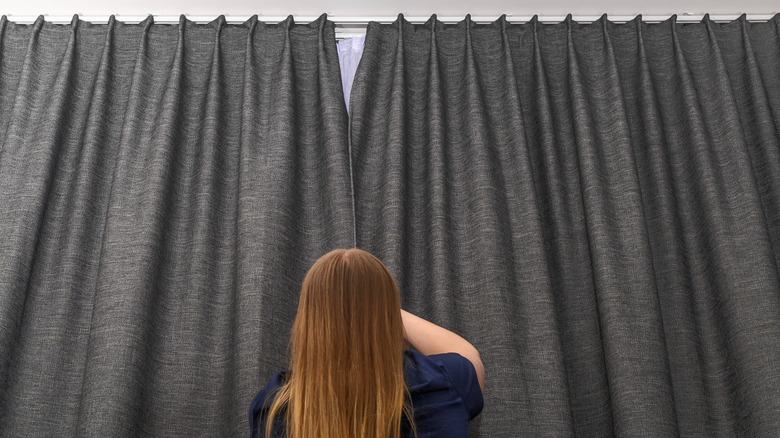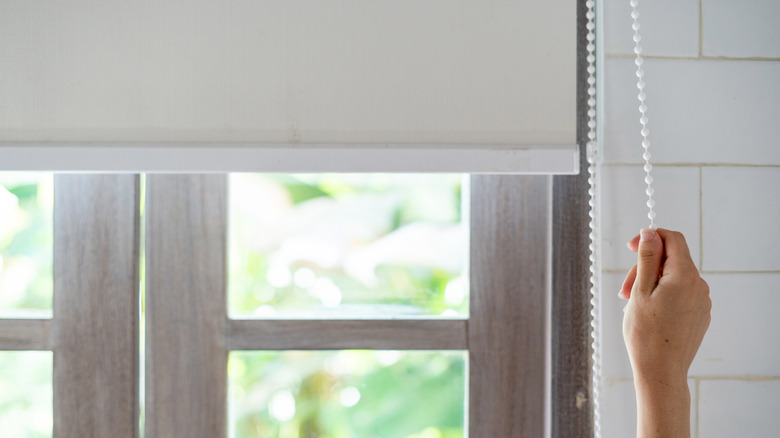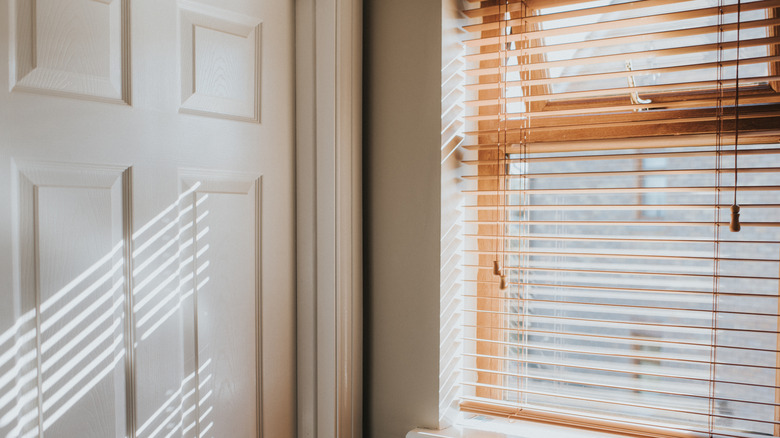The Toxic Problem With Blackout Curtains That Nobody Warned You About
Blackout curtains and drapery types are a game-changer for those who struggle with early mornings or the constant glow of city lights disrupting their sleep. They can seriously improve your rest and overall health. But there's a downside: some blackout curtains and roller shades are made from materials like polyvinyl chloride (PVC), synthetic fabrics like polyester, or with a foam backing that could actually harm your health.
Synthetic fabrics like polyester, nylon, and acrylic are treated with chemicals to improve their strength and durability. Over time, these fabrics can release toxic gases produced by those chemicals, also called volatile organic compounds (VOCs), into the air. The process, called off-gassing, is particularly high with new furniture and fabrics since the gases have not had time to be released.
Breathing in VOCs is potentially dangerous. According to the U.S. Environmental Protection Agency, they can irritate your eyes, nose, and throat, and cause headaches. Long-term exposure could lead to more serious issues, like damage to your liver, kidneys, or central nervous system. Even more concerning, some VOCs have been linked to cancer in animals, and a few are suspected of being carcinogenic to humans.
Why PVC roller shades are not a safer blackout curtain alternative
Instead of opting for synthetic fabric blackout curtains, some people turn to roller shades to block out the sun. While they do the job, many of these shades are made with a PVC layer, which comes with its own set of health concerns. PVC contains chemicals called phthalates, which can cause harm. There are three ways you may be exposed to PVC: ingestion, inhalation, and skin contact. The Center for Health, Environment, and Justice has warned that exposure to PVC can damage your immune and reproductive systems, increase your risk of brain and liver cancer, and harm your liver.
Though PVC has become a common material in everyday items like packaging, toys, and home furnishings, it's widely regarded as toxic. You can begin swapping out those consumer items in your home for PVC-free alternatives (check the shower curtain in your bathroom, too!).
PVC is not only dangerous for your health, it is also environmentally damaging. Producing PVC generates chemical pollutants including dioxins and vinyl chloride, and it is difficult to recycle because of these chemical components. As a result, only a very small percentage of PVC is recycled.
What alternatives should you use instead of toxic blackout curtains?
For a healthier home environment, fabric curtains made from natural fibers like cotton or linen are excellent alternatives to potentially toxic materials like PVC and synthetic fabrics. While these materials are typically thinner and therefore less opaque to black out light completely, several brands have started to produce blackout curtains that are plastic-free and made from organic materials like cotton, linen, or hemp. Organic blackout curtains can be effective thanks to having two separate layers: a darker one to block out the light and another lighter one facing the room for better color and design options.
If you're not sure where to start, look for certifications from organizations like GreenGuard and Oeko Tex, which ensure the fabrics meet safety standards for indoor air quality. Wood or bamboo blinds are another safe and stylish option, adding a natural touch to your space. Just be cautious of faux wood — it may contain PVC, which defeats the purpose of going with a natural alternative.
And if you're concerned about VOCs hanging around in your home, consider investing in an air purifier with an air quality sensor. These harmful chemicals aren't just in blinds. They can also be found in paint, new furniture, and other household items.


